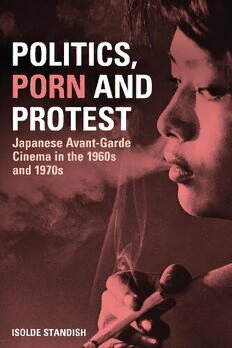
Politics, Porn and Protest: Japanese Avant-Garde Cinema in the 1960s and 1970s PDF
Preview Politics, Porn and Protest: Japanese Avant-Garde Cinema in the 1960s and 1970s
PPOOLLIITTIICCSS,, PPOORR NN AANNDD PPRROOTTEESSTT PPOOLLIITTIICCSS,, PPOORRNN AANNDD PPRROOTTEESSTT JAPANESE AVANT-GARDE CINEMA IN THE 1960s AND 1970s B Y I S O L D E S TA N D I S H 2011 The Continuum International Publishing Group 80 Maiden Lane, New York, NY 10038 The Tower Building, 11 York Road, London SE1 7NX www.continuumbooks.com Copyright © 2011 Isolde Standish All rights reserved. No part of this book may be reproduced, stored in a retrieval system, or transmitted, in any form or by any means, electronic, mechanical, photocopying, recording, or otherwise, without the permission of the publishers. Library of Congress Cataloging-in-Publication Data Standish, Isolde. Politics, porn, and protest : Japanese avant-garde cinema in the 1960s and 1970s / by Isolde Standish. p. cm. Includes bibliographical references and index. Includes filmography. ISBN-13: 978-0-8264-4470-7 (hardcover : alk. paper) ISBN-10: 0-8264-4470-9 (hardcover : alk. paper) ISBN-13: 978-0-8264-3901-7 (pbk. : alk. paper) ISBN-10: 0-8264-3901-2 (pbk. : alk. paper) 1. Motion pictures–Political aspects–Japan. 2. Motion pictures–Japan–History–20th century. 3. Experimental films–Japan–History–20th century. I. Title. PN1993.5.J3S73 2011 791.430952–dc22 2011003730 EISBN: 978-1-4411-4439-3 Typeset by Newgen Imaging Systems Pvt Ltd, Chennai, India Printed and bound in the United States of America To recognize untruth as a condition of life: that, to be sure, means to resist customary value-sentiments in a dangerous fashion; and a philosophy which ventures to do so places itself, by that act alone, beyond good and evil. (Nietzsche 1990: 36) Better be wrong and murder no one than be right in a slaughter- house. (Albert Camus quoted in Cohen-Solal 2005: 305) CCOONNTTEENNTTSS Notes on Translation and Acknowledgements ix Introduction 1 1 Film and Philosophy: Towards a Cinema of Praxis 15 2 The Art Theatre Guild: Theatres of Death and the Challenge of History 49 3 Overcoming History: Originary Societies, Pornography and Terrorism 79 4 Documentary and Performance 115 Refl ections 145 Notes 157 Filmography 165 Select Bibliography 171 Appendix: Historical Chronology 177 Index 187 — vii — NNOOTTEESS OONN TTRRAANNSSLLAATTIIOONN AANNDD AACCKKNNOOWWLLEEDDGGEEMMEENNTTSS Japanese names are given in the Japanese order of surname and first name. In the case of film titles, where standard known English translations exist I have followed custom. In the case of films made by Yoshida (Kijū) Yoshishige, I have also given the French titles as many of his films have been released recently on DVD in France. In the Filmography I have given the titles in Japanese in kanji (Chinese ideograms) to avoid confusion. In most cases I have taken the Japanese readings for the romanization of film titles from the Pia Cinemakurabu Nihon Eiga Hen 2007 annual film reference. I have also drawn primarily on this source for the readings of names, the birth and, where applicable, death dates of filmmakers and actors. Alternative sources included the Kinema Junpō publications of the complete directory for directors (1988), actors (1991) and actresses (1991). As with film titles, I have included the dates of filmmakers and actors in the first reference to them in each chapter. I have done this as some readers may wish to read a chapter as a discrete entity. In regard to the dates of historical and literary figures, I have drawn primarily on the fifth edition of the Kōjien (Iwanami Shoten) and the Nihon Daihyakka Zensho Nipponica Lite Pack CD-ROM (Shogakukan 2003). I have made use of macrons to indicate long vowel sounds when transliterating Japanese names and words. I have excluded them from well-known place-names, such as Tokyo and Kyoto. All translations from the Japanese are my own unless otherwise stated. Quotations from Japanese films were taken both from the videos/DVDs during repeated viewings and from screenplays when available. However, in the cases of the following films, which have been released with good quality English language subtitles, I have stayed close to the subtitled translations – Insect Woman (1963), The Pornographers (1966), Under the Flag of the Rising Sun (1972), Extreme Private Eros Love Song 1974 (1974) and The Emperor’s Naked Army Marches On (1987). — ix —
